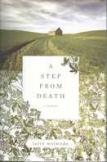A Crazy-Making Existence
A Step From Death continues the meditative, autobiographical narrative whose first volume was What I Think I Did, with some origins also in Larry Woiwode’s Acts: A Writer’s Reflections on the Church, Writing, and His Own Life. In the non-chronological and scattered way of memory, all three books recount Larry Woiwode’s story of starting out as an actor in New York City, where he became a lifelong friend of “Bob” DeNiro, then shifting to writing under the paternal guidance of William Maxwell, fiction editor at The New Yorker.
Woiwode’s wonderful first novel, What I’m Going to Do, I Think, won the William Faulkner Foundation Award for 1969 and was followed by a peripatetic, crazy-making existence as he labored obsessively over Beyond the Bedroom Wall, a family saga that sold over two million copies and that some consider the great American novel. Eventually Woiwode gave up an English professor’s job in Binghamton, N.Y., to try his hand at full-time writing, raising registered quarterhorses, and doing “peasant” chores on 160 isolated acres in the arid, high plains of his home state of North Dakota.
This memoir, though, is addressed to his only son, Joseph, an Army helicopter pilot in Iraq, and is inspired by a horrific accident that occurred while he was baling hay that almost cost Woiwode his life. His jacket sleeve was caught by a power take-off shaft spinning at 500 r.p.m. underneath the tractor seat. Yanked to the ground,
my chest felt as crushed as if the field itself had fallen on me, emptying my lungs, and my right arm, from armpit to elbow, was bound so tightly by the twistings of my jacket to the PTO shaft it felt like steel. I was half on my back, hanging by the arm, suspended between present death and a future where I was free. I can’t say a presence appeared to provide the help I needed, but whatever is always present took on a sparkling intensity.
Ribs broken, ligaments torn, Woiwode got himself free after a lonely, desperate, agonizing, two-hour struggle during which he remembered how field mice sometimes died of sheer panic with only a forepaw caught in a trap.
Woiwode’s What I’m Going to Do, I Think was followed by a peripatetic, crazy-making existence as he labored obsessively over Beyond the Bedroom Wall.
Healing from his injuries allowed him many sleepless, pain-wracked hours for reflection and reconsideration, particularly of his own father, a noble widower and superintendent of a high school in Sykeston, N.D., whom Woiwode can finally admit he loves and admires and hopes he resembles.
Late in the book, Woiwode notes how he watched his son Joseph walking their fields with his own boy, Timothy :
and the angle your arm takes to hold his raised hand trips my memory into an avalanche, and I’m displaced to the year we arrived, when the family would lie below the lilacs at the edge of the yard on blankets your mother spread on the grass, inhaling a scent of chlorophyll and wool, and you would roll on your back and reach for the cumulus piled in an illusion of mountainous cascades overhead as if you could pluck down a cloud in your plump hand.
A Step From Death is full of such gorgeous poetic descriptions, the kind of passages that urge lingering; but the chaotic “avalanche” of memories can make it hard going for the reader, who is jerked from a scene with William Maxwell in the offices of The New Yorker to a decade later in North Dakota when Woiwode argues with the state for the right to home-school his four children. The memoir cries out for photographs, but there are none, and even the help of a chronological listing of Woiwode’s books is strangely missing. Only one date is specifically mentioned: Jan. 31, 1951, the day when the mother of the 9-year-old Larry died, a tragedy that haunts every moment in Beyond the Bedroom Wall and The Neumiller Stories and much of Woiwode’s writing since.
Those objections aside, A Step From Death is a fascinatingly intimate memoir, peppered with gruff opinions and kitchen table reminiscence, but also full of wisdom, generosity, humility, love of wife and family and reverence for the earth. He hints in the memoir that he has several other books nearing completion, and I will be among the thousands who cannot wait to read them.
This article also appeared in print, under the headline “A Crazy-Making Existence,” in the August 18, 2008, issue.











